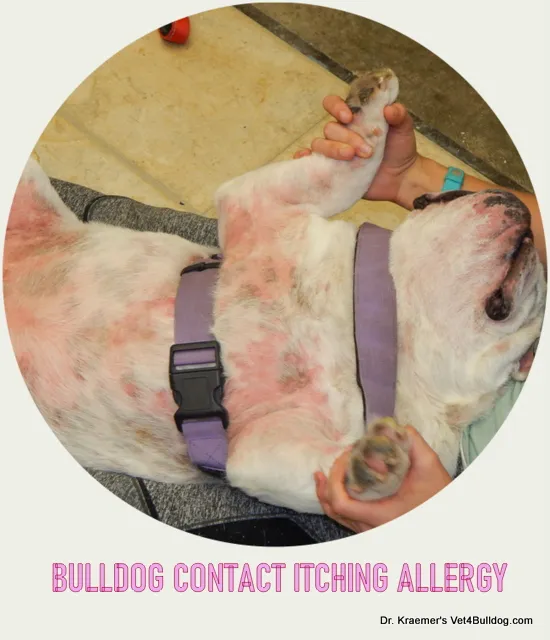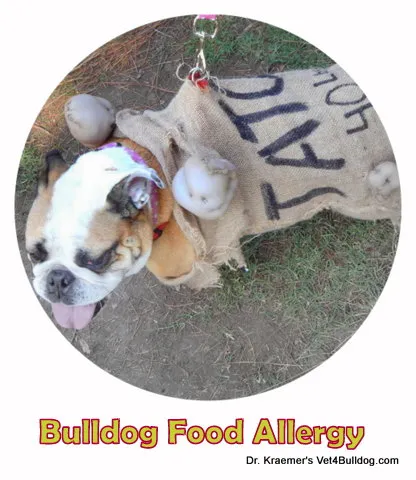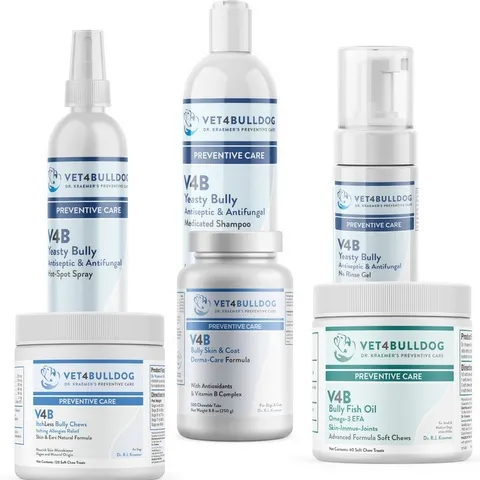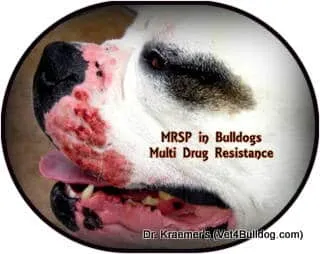French Bulldogs are beloved for their charming personalities and distinctive looks, but they are also notoriously prone to a range of skin issues, with itching being one of the most common and distressing. If your French Bulldog is constantly scratching, licking, or biting, they might be suffering from an underlying allergic condition. Understanding the root causes, proper diagnosis, and effective remedies is crucial for providing your beloved companion with much-needed relief and improving their quality of life. This guide, drawing on veterinary expertise, offers a detailed look into managing itchy skin in French Bulldogs, focusing on practical solutions and preventative strategies.
Understanding French Bulldog Itchy Skin: Common Causes
Itching in French Bulldogs is frequently a symptom of various allergic reactions, which can manifest as redness, bumps, and discomfort in areas like the ears, face, and belly. Identifying the specific allergen is key to effective management.
Atopic Environmental Itch Dermatitis
This is arguably the most prevalent allergy affecting French Bulldogs, often having a genetic predisposition. Environmental allergens can include a wide array of triggers:
- Genetic Factors: French Bulldogs have a hereditary underpinning that makes them more susceptible to atopic dermatitis.
- Common Allergens: Pollen from trees, grasses, and weeds, as well as indoor culprits like dust mites and mold, are frequent offenders. Unlike humans who typically inhale allergens, these often penetrate the compromised skin barrier of sensitive dogs.
Food Itch Dermatitis
While less common than environmental allergies, food allergies can also cause significant itching. These are primarily triggered by proteins, usually from animal sources, in their diet. Common food allergens include:
- Beef
- Chicken & Turkey
- Fish
- Egg
Flea Itch Allergy
Even a single flea bite can cause an intense allergic reaction in sensitive French Bulldogs. The itching is triggered by allergens injected with flea saliva during the blood meal. This type of allergy can lead to severe discomfort and secondary skin infections if not promptly addressed.
Contact Itch Allergy
Direct contact with certain substances can provoke an allergic reaction. This can range from environmental elements to topical products. Some common contact allergens include:
- Pesticides & Insecticides (often found in flea collars or topical flea products)
- Grass & Lawn treatments (fertilizers & herbicides)
- Topical medications (certain shampoos or flea treatments)
- Bedding & Blanket materials
Recognizing the Signs: What Does Itchy Skin Look Like?
When a French Bulldog suffers from allergies, the symptoms extend beyond simple scratching. Pet owners should be vigilant for a range of indicators that point to discomfort and potential secondary issues.
Behavioral and Physical Manifestations of Itching
- Self-trauma: Persistent itching often leads to behaviors like biting, chewing, excessive licking, and grooming. These actions, while an attempt to relieve discomfort, can exacerbate skin damage.
- Inflammation: Affected areas may become red, raw, and develop small bumps. These are clear signs of skin irritation.
- Odor & Discoloration: Chronic skin issues can lead to an unpleasant odor and sometimes a reddish-brown discoloration of the fur, especially around areas of constant licking due to yeast overgrowth.
- Dander & Flakes: Dry, flaky skin (dander) is also a common symptom, indicating a compromised skin barrier.
Hair Loss Distribution Patterns
The location of hair loss can sometimes offer clues about the type of allergy affecting your French Bulldog:
- Flea Allergy: Itching, hair loss, and red bumps are typically concentrated at the distal back and around the tail base.
- Contact Allergy: Hair loss, redness (erythema), and itching occur specifically at the point of contact with the allergen. For example, a reaction to a flea collar would be localized around the neck area, while exposure to lawn pesticides might cause issues on the belly.
 Contact Allergy on a Bulldog's Belly
Contact Allergy on a Bulldog's Belly
- Environmental Allergy: Hair loss and itching are frequently observed on the paws, ear bases, belly, elbows, and hind legs.
- Food Allergy: The distribution of hair loss and itching caused by food allergies often mirrors that of environmental allergic dermatitis, making differentiation challenging without specific diagnostic tests.
Diagnosis: Uncovering the Root Cause of Your French Bulldog’s Itch
Accurately diagnosing the type of allergy is a critical step towards effective treatment. A veterinarian typically employs a combination of examinations, history taking, and specific tests.
Diagnostic Approaches for Different Allergies
- Environmental Atopic Allergy: Diagnosing atopic allergies can be complex due to the absence of definitive tests. The process often relies on an elimination approach, considering factors such as the dog’s age, the distribution pattern of skin itch and hair loss, seasonal patterns of symptoms, and the response to steroid treatments for itchiness.
- Food Allergy: The gold standard for diagnosing food allergies is an elimination diet trial. This involves feeding a prescription hypoallergenic elimination diet for at least 8 weeks, followed by a “challenge” phase where the previously suspected food allergens are reintroduced to confirm the reaction.
 Bulldog suffering from a food allergy with red, inflamed skin
Bulldog suffering from a food allergy with red, inflamed skin
- Flea Allergy: Diagnosis is usually based on the presence of fleas or flea dirt, the timing (often during warmer months), and the characteristic distribution of hair loss on the dorsal-distal lumber and tail base.
- Contact Allergy: This is diagnosed by observing a focal reaction at the site of contact and identifying a suspicious allergen (e.g., a new flea collar, recently treated grass, or new bedding).
Essential Diagnostic Tests
Beyond identifying allergy types, your veterinarian may perform several tests to rule out other conditions or identify secondary infections:
- Skin Scrape: To rule out skin mites such as Demodex and sarcoptic mange.
- Cytology: To check for the presence of secondary bacterial and/or yeast infections.
- DTM (Dermatophyte Test Medium): A fungal culture to rule out ringworm (dermatophytes).
- Culture: Helps identify specific types of bacteria (e.g., gram-negative rods vs. gram-positive cocci) if a severe infection is suspected.
- Biopsy: In rare or unresponsive cases, a biopsy may be taken to rule out autoimmune diseases, skin cancer, or other complex dermatological conditions.
Effective Remedies and Treatments for French Bulldog Itchy Skin
Managing itchy skin in French Bulldogs often requires a multi-faceted approach, combining home care with veterinary interventions. The goal is not only to relieve current symptoms but also to prevent recurrence and strengthen the skin’s natural defenses.
Home Care & Preventative Measures
Preventative care and home-based remedies form the cornerstone of long-term management for allergic French Bulldogs.
- Bathing & Water: Regular bathing with water alone can be soothing and helps physically wash away allergens, dander, and fleas from the skin surface. Given that environmental allergens largely enter via the skin, this is a crucial step.
- Medicated Shampoos & Conditioners: Therapeutic topical products, including medicated shampoos, rinses, wipes, gels, and cream rinses, are essential for both short-term relief and long-term allergy control. These may include formulations that moisturize, relieve itch, or are hypoallergenic. Specific products often target anti-dander, anti-flake relief, and general itch reduction.
- Medicated Antibacterial & Anti-Yeast Antiseptics: Many allergic French Bulldogs develop secondary bacterial and yeast infections due to compromised skin barriers. Antiseptic shampoos and gels specifically formulated to combat yeast (e.g., Yeasty Bully shampoo) and bacteria (e.g., Antiseptic XS shampoo) are vital for managing these opportunistic pathogens.
 A bundle of therapeutic skincare products for bulldogs
A bundle of therapeutic skincare products for bulldogs
- Therapeutic Supplements: Supplements can play a significant role in restoring the skin barrier, boosting the immune system, and reducing inflammation. These often include fish oil (rich in EFAs for skin, joint, and immune health), pre & probiotics for gut and immune support, and general immune support supplements.
- Grooming for Skin Barrier Wellness: Bathe your French Bulldog as needed, but avoid over-bathing which can strip natural oils. Using hypoallergenic shampoos and moisturizing conditioners, such as those with oatmeal and aloe, can help maintain skin hydration and health.
- Flea Control: Consistent, year-round flea prevention is paramount. Flea control medications not only prevent flea allergies but some also offer protection against mites like Demodex and Sarcoptic Mange. Community-wide adherence to flea prevention significantly reduces overall flea populations.
- Environmental Control: Keeping your home clean and free from common indoor allergens like dust mites and mold is important. Proper ventilation and air purifiers can help reduce indoor allergen concentrations.
Veterinary Treatments
For more severe or persistent cases, your veterinarian may recommend prescription-strength treatments.
- Allergen Immunotherapy: This life-long hypersensitization treatment aims to desensitize your French Bulldog to specific allergens. If effective, it typically involves regular injections administered at home.
- Non-Steroidal Itch Control:
- Cyclosporine: An oral medication given twice a week or every other day, which can control itch with fewer steroid-related side effects, though vomiting can occur.
- Apoquel: An oral medication providing itch relief for about 10 hours. Long-term, twice-daily use may cause immune suppression and is typically prescribed only for adult dogs.
- Cytopoint injections: These injections can provide 6-8 weeks of itch relief with minimal side effects and are safe for puppies.
- Antihistamines:
- First-generation antihistamines like Benadryl can aid in sedation, making them useful before bedtime. They are generally safe and available over-the-counter.
- Second- and third-generation antihistamines (e.g., hydroxyzine) may be more effective for itch control when combined with other prescription medications, but as a standalone treatment, they are often less potent.
- Stem Cell Therapy: In some non-responsive cases, stem cell therapy can be considered. It has no reported side effects and may also help with other medical conditions.
- Antibiotics: When secondary bacterial infections are confirmed by cytology, antibiotics are necessary. However, judicious use, guided by cytology and culture/sensitivity testing, is crucial to prevent multidrug-resistant bacteria (MRSP).
 French Bulldog with severe skin disease caused by MRSP
French Bulldog with severe skin disease caused by MRSP
- Anti-Yeast RX (Malassezia): If a secondary yeast infection is present, antifungal medication will be recommended to clear the infection and reduce itching.
Understanding the Skin Barrier and Its Repair
The skin barrier, primarily the epidermis, is your French Bulldog’s first line of defense against external threats and plays a crucial role in overall skin health.
Functions of the Skin Barrier
- Protective Barrier: It shields against allergens, bacteria, fungi, parasites, and other harmful substances, preventing them from entering deeper skin layers.
- Moisture Retention: It prevents excessive water loss, keeping the skin hydrated, elastic, and free from dryness and cracking.
- Temperature Regulation: It helps maintain body temperature by controlling sweat evaporation and providing insulation.
- Immune Defense: Contains immune cells that respond to threats like infections or allergens, initiating an immune response.
In allergic French Bulldogs, this barrier becomes compromised, making the skin vulnerable to irritants, allergens, and infections by bacteria and yeast.
How to Repair Your French Bulldog’s Skin Barrier
Maintaining and repairing the skin barrier is essential for preventing skin issues and promoting overall skin health.
- Therapeutic Supplements: Specific supplements can aid in strengthening the skin barrier from within.
- Grooming: Regular, appropriate bathing with hypoallergenic and moisturizing shampoos/conditioners helps maintain natural oils and prevents dryness.
- Flea Control: Consistent parasite control prevents infestations that can damage the skin barrier.
- Environmental Control: Keeping the environment clean and free from dust, mold, and other allergens reduces the burden on the skin barrier.
- Customized Care: Your veterinarian can recommend specific treatments and dietary changes tailored to your French Bulldog’s individual needs.
When to Use Steroids: Benefits and Risks
Steroids like prednisone can offer immediate relief from itching and inflammation, making them a common choice for allergic flare-ups. However, their use requires careful consideration due to potential adverse effects, especially with long-term or high-dosage administration.
Effectiveness of Steroids Across Allergy Types
- Environmental Allergy: French Bulldogs with atopic dermatitis typically respond very well to corticosteroids (e.g., prednisone, Depo-Medrol).
- Food Allergy: Steroids may show limited or no improvement for itching caused by dietary allergens, highlighting the importance of a food trial.
- Flea Allergy: While steroids can provide good relief, preventing flea infestations through consistent preventatives is a more advisable approach than relying on corticosteroids.
- Contact Allergy: Steroids effectively relieve itching from most contact allergies, but the primary solution involves removing or eliminating the offending allergen (e.g., a flea collar).
Potential Steroid Side Effects
While inexpensive and effective for symptom management, steroids carry significant risks, which increase with higher dosages and longer treatment durations.
- Weakened Immune System: Can lead to secondary bacterial and yeast infections, Demodex mites, urinary tract infections (UTIs), and intestinal dysbiosis.
- PU/PD: Increased thirst and urination, potentially leading to accidents indoors.
- Obesity: Due to increased appetite.
- Other Serious Conditions: Including diabetes, Cushing’s syndrome, liver steroid hepatopathy, and orthopedic problems.
Steroids are best reserved for acute flare-ups or short-term relief. When used, veterinarians typically strategize tapering off the dosage to the minimum necessary, and routine safety screens (blood and urine tests) are recommended to monitor for side effects. A crucial warning is that steroid-induced immunosuppression can cause subclinical demodicosis to erupt.
Conclusion
Managing itchy skin in French Bulldogs is a journey that demands patience, keen observation, and a close partnership with your veterinarian. By understanding the common causes—environmental, food, flea, and contact allergies—and recognizing the diverse symptoms, you can take proactive steps toward diagnosis and effective treatment. While immediate relief options like steroids exist, focusing on long-term remedies such as therapeutic bathing, supplements, strict flea control, and environmental management is essential for maintaining a healthy skin barrier and preventing recurrence. Always prioritize professional veterinary advice for accurate diagnosis and a tailored treatment plan to ensure your French Bulldog enjoys a comfortable, itch-free life.
